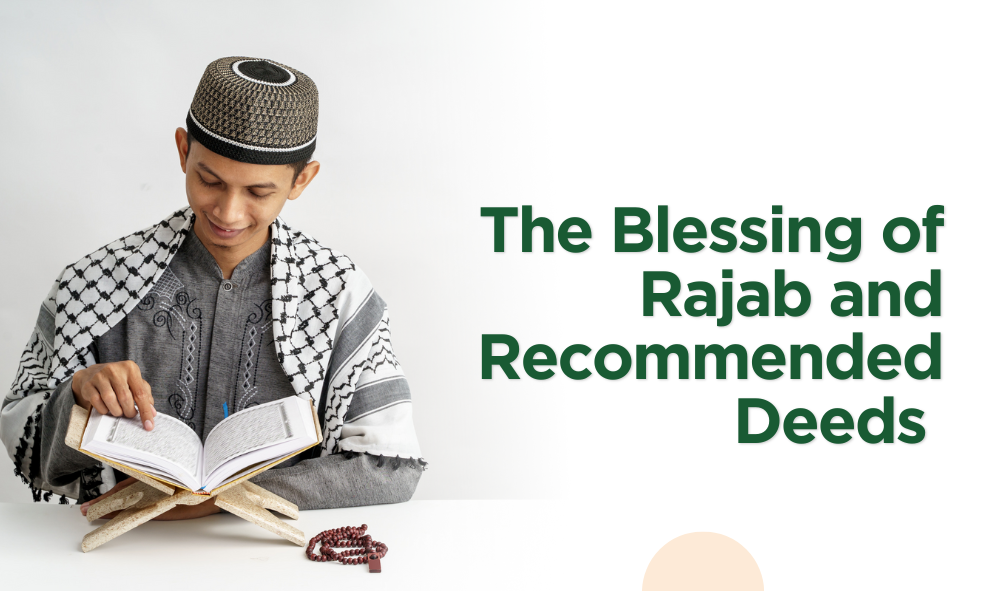The Blessing of Rajab and Recommended Deeds
The Virtues of Rajab
The virtues of Rajab in Islam are often overlooked or even unknown by some Muslims. Apart from Ramadan, Islam has been set for four other special months as sacred months, one of those four is The Rajab.
The virtues of the month of Rajab are emphasized in Allah ﷻ’s words in QS At-Taubah: 36, as explained in Tafsir Al-Muyassar by the Ministry of Religious Affairs of Saudi Arabia. It is stated that in the Haram Months Allah forbids war, except for the defense, in them (That is Dhul-Qa’dah, Dhul-Hijjah, Muharram, and Rajab).
Allah ﷻ says:
إِنَّ عِدَّةَ ٱلشُّهُورِ عِندَ ٱللَّهِ ٱثْنَا عَشَرَ شَهْرًا فِى كِتَٰبِ ٱللَّهِ يَوْمَ خَلَقَ ٱلسَّمَٰوَٰتِ وَٱلْأَرْضَ مِنْهَآ أَرْبَعَةٌ حُرُمٌ ۚ ذَٰلِكَ ٱلدِّينُ ٱلْقَيِّمُ ۚ فَلَا تَظْلِمُوا۟ فِيهِنَّ أَنفُسَكُمْ ۚ وَقَٰتِلُوا۟ ٱلْمُشْرِكِينَ كَآفَّةً كَمَا يُقَٰتِلُونَكُمْ كَآفَّةً ۚ وَٱعْلَمُوٓا۟ أَنَّ ٱللَّهَ مَعَ ٱلْمُتَّقِينَ
“Indeed, the number of months with Allāh is twelve [lunar] months in the register of Allāh [from] the day He created the heavens and the earth; of these, four are sacred. That is the correct religion [i.e., way], so do not wrong yourselves during them. And fight against the disbelievers collectively as they fight against you collectively. And know that Allāh is with the righteous [who fear Him].” (QS At-Taubah: 36)
The Prophet ﷺ also explained the virtues of the Rajab in his speech:
أَنَّ النَّبِيَّ صَلَّى اللَّهُ عَلَيْهِ وَسَلَّمَ خَطَبَ فِي حَجَّتِهِ فَقَالَ إِنَّ الزَّمَانَ قَدْ اسْتَدَارَ كَهَيْئَتِهِ يَوْمَ خَلَقَ اللَّهُ السَّمَوَاتِ وَالْأَرْضَ السَّنَةُ اثْنَا عَشَرَ شَهْرًا مِنْهَا أَرْبَعَةٌ حُرُمٌ ثَلَاثٌ مُتَوَالِيَاتٌ ذُو الْقِعْدَةِ وَذُو الْحِجَّةِ وَالْمُحَرَّمُ وَرَجَبُ مُضَرَ الَّذِي بَيْنَ جُمَادَى وَشَعْبَانَ
Narrated Abu Bakr:
The Prophet (ﷺ) said, “Time has come back to its original state which it had when Allah created the Heavens and the Earth; the year is twelve months, four of which are sacred. Three of them are in succession; Dhul-Qa’da, Dhul-Hijja and Al-Muharram, and (the fourth being) Rajab Mudar (named after the tribe of Mudar as they used to respect this month) which stands between Jumad (ath-thani) and Sha’ban.” (Shahih al-Bukhari 4662)
This Hadits shows the great virtues of Rajab in Islam, as a time honored by Allah ﷻ. Due to its greatness, Rajab is also known by other names in addition to “Rajab.”
Also Read: Warming Up Before Ramadan
Other Names for the Month of Rajab
In addition to its virtue as a sacred month, Rajab is known by two other titles as explained by Sheikh Abu Abdillah Muhammad bin Sa’id ya Ruslan.
- Fardu Month
Rajab is called the Fardu month, meaning “one,” because it is the only sacred month that stands alone, not sequential with the other three sacred months (Dhul-Qa’dah, Dhul-Hijjah, and Muharram). This special time for being standing alone gives Rajab a unique identity. - Asham Month
Rajab is also called the Asham month, meaning “deaf,” because in Rajab, the sound of weapons or war is unheard. During the pre-Islamic Arab era or jahiliyyah era, this tradition showed honor for Rajab by ceasing all conflicts and storing their weapons. They even visited the homes of former enemies as a sign of honoring the peace associated with this sacred month.
Recommended Acts During Rajab
In Rajab, Muslims are encouraged to increase good deeds and avoid all forms that make you go to hell. Even Though that is obvious, that is because in Rajab the divine reward and sin is double or even more . Two key points to guide you in filling this month with goodness:
- Increasing Good Deeds
A believer seeking the contentment of Allah’s ﷻ should as fast as possible perform deeds that both wajib and sunnah. Allah ﷻ says:
وَسَارِعُوْٓا اِلٰى مَغْفِرَةٍ مِّنْ رَّبِّكُمْ وَجَنَّةٍ عَرْضُهَا السَّمٰوٰتُ وَالْاَرْضُۙ اُعِدَّتْ لِلْمُتَّقِيْنَۙ
“And hasten to forgiveness from your Lord and a garden [i.e., Paradise] as wide as the heavens and earth, prepared for the righteous.” (TQS Ali Imran [3]: 133)
However, in Islam, the good deeds must align with the Sharia established by Allah. The Prophet Muhammad ﷺ said:
عَنْ عَائِشَةَ قَالَتْ قَالَ رَسُولُ اللَّهِ صَلَّى اللَّهُ عَلَيْهِ وَسَلَّمَ مَنْ عَمِلَ عَمَلًا لَيْسَ عَلَيْهِ أَمْرُنَا فَهُوَ رَدٌّ
“Aisha reported: The Messenger of Allah, peace and blessings be upon him, said, “Whoever performs a deed that is not in accordance with our matter, it will be rejected.” (Sahih Muslim 1718)
Deeds that considered good by human standards are not necessarily righteous if they contradict Allah’s ﷻ laws. For example, providing for one’s family from haram income like riba (like interest in conventional banks), bribery, or corruption does not count as righteous. Similarly, a ruler, who rules in a country, handing over public wealth to a group (like a party or business group) or obstructing the implementation of Islamic law also fails to qualify as a righteous deed, despite maybe that looks good for people.
Allah ﷻ says:
قُلْ هَلْ نُنَبِّئُكُمْ بِالْأَخْسَرِينَ أَعْمَالًا الَّذِينَ ضَلَّ سَعْيُهُمْ فِي الْحَيَاةِ الدُّنْيَا وَهُمْ يَحْسَبُونَ أَنَّهُمْ يُحْسِنُونَ صُنْعًا
“Say, [O Muḥammad], Shall we [believers] inform you of the greatest losers as to [their] deeds? [They are] those whose effort is lost in worldly life, while they think that they are doing well in work.” (TQS Al-Kahf [18]: 103-104)
In contrast, truly valuable righteous deeds align with Allah’s commands, such as fighting for justice, implementing All Sharia Law, and leading with fairness. The leader that is fair, can be more important or get more divine reward than a muslim that does worship (like pray, or something that looks spiritual) for decades, as it explained in various Islam literature.
- Abandoning Injustice
A servant who fears Allah ﷻ’s punishment should immediately leave behind all forms of wrongdoing that make him got a sin.
Muslims are reminded to fulfill this month with more good deeds because of the virtues of Rajab as a moment for introspection, repentance, and self-improvement. Thus, Rajab becomes a month of blessings and a stepping stone toward the noble month of Ramadan.
Conclusion
The virtues of Rajab should be maximized by anyone wishing to perfect their taqwa to Allah ﷻ through righteous deeds in all aspects of life. Let as soon as possible seek toward Allah’s forgiveness and the Paradise prepared for muslim that with taqwa. May the glory of Islam return to this world, and may we be among those warriors for it. Ameen Ya Rabbal Alamin.
Wallahu’alam bissawab.
Also Read: 6 Tips Financial Prepare For Ramadan

Let’s Visit, Zeed and join for halal investment with Zeed.
Referensi :
- Al Quran Al Karim
Asy-Syahru Rajab, Sai’id Ruslan, Maktabah an-Noor. Tafsir Al-Muyassar Tafsir Al-Muyassar / Kementerian Agama Saudi Arabia QS At-Taubah: 36. Diakses dari https://tafsirweb.com/3052-surat-at-taubah-ayat-36.html - Hadith Sahih Bukhari 4662 from https://sunnah.com/bukhari%3A4662
- Hadith Sahih Bukhari 1718 from https://www.abuaminaelias.com/dailyhadithonline/2023/02/07/bidah-rejected







